Expanded form of Decimal Fractions
We will discuss here about the expanded form of decimal fractions.
In expanded form of decimal fractions we will learn how to read and write the decimal numbers.
Decimal numbers can be expressed in expanded form using the place-value chart. Let us consider the number 561.129. Let us expand each of the digits using the place-value chart.
So, we can write 561.129 in the expanded form as follows.
561.129 = 500 + 60 + 1 + 0.1 + 0.02 + 0.009
= 5 hundreds + 6 tens + 1 ones + 1 tenths + 2 hundredths + 9 thousandths
= 500 + 60 + 1 + 110 + 2100 + 91000
Again,
493.2 = 4 hundreds + 9 tens + 3 ones + 2 tenths
= 400 + 90 + 3 + 210
1436.74 = 1 thousands + 4 hundreds + 3 tens + 6 ones + 7 tenths + 4 hundredths
= 1000 + 400 + 30 + 6 + 710 + 4100
Note: When a decimal is missing either in the integral part or decimal part, substitute with 0.
Consider the number 123.437
Let us write the digits if this number as per their place value.
123.437 = 1 hundreds + 2 tens + 3 ones + 4 tenths + 3 hundredths + 7 thousandths
= 100 + 20 + 3 + 4/10 + 3/100 + 7/1000
= 100 + 20 + 3 + 0.4 + 0.03 + 0.007
Thus, 123.437 = 100 + 20 + 3 + 0.4 + 0.03 + 0.007
1. Write the decimal numbers in expanded
form:
(i) 3479.105
= 3 thousands + 4 hundreds + 7 tens + 9 ones + 1 tenths + 0 hundredths+ 5 thousandths
= 3000 + 400 + 70 + 9 + 110 + 0100 + 51000
(ii) 7833.45
= 7 thousands + 8 hundreds + 3 tens + 3 ones + 4 tenths + 5 hundredths
= 7000 + 800 + 30 + 3 + 410 + 5100
(iii) 21.1097
= 2 tens + 1 ones + 1 tenths + 0 hundredths + 9 thousandths + 7 ten thousandths
= 20 + 1 + 110 + 0100 + 91000 + 710000
(iv) 524.1
= 5 hundreds + 2 tens + 4 ones + 1 tenths
= 500 + 20 + 4 + 110
(v) 143.011
= 1 hundreds + 4 tens + 3 ones + 0 tenths + 1 hundredths + 1 thousandths
= 100 + 40 + 3 + 010 + 1100 + 11000
(vi) 840.006
= 8 hundreds + 4 tens + 0 ones + 0 tenths + 0 hundredths + 6 thousandths
= 800 + 40 + 0 + 010 + 0100 + 61000
(vii) 64.21
= 6 tens + 4 ones + 2 tenths + 1 hundredths
= 60 + 4 + 210 + 1100
(viii) 4334.334
= 4 thousands + 3 hundreds + 3 tens + 4 ones + 3 tenths + 3 hundredths + 4 thousandths
= 4000 + 300 + 30 + 4 + 310 + 3100 + 41000
2. Write as decimal fractions:
(i) 8 thousands + 8 ones + 3 tenths + 9 hundredths
= 8008.39
(ii) 4000 + 7 + 510 + 6100
= 4007.56
(iii) 6 hundreds + 9 tens + 8 tenths + 4 thousandths
= 690.804
(iv) 3 tens + 7 ones + 6 hundredths + 8 thousandths
= 37.068
(v) 400 + 50 + 1 + 9100
= 451.09
(vi) 800 + 70 + 2 + 810 + 51000
= 872.805
(vii) 6 tens + 5 tenths + 8 hundredths
= 60.58
(viii) 9 hundreds + 4 tens + 3 tenths + 4 hundredths
= 940.34
3. Write the following in short form.
(i) 100 + 0.5 + 0.06 + 0.008 (ii) 80 + 1 + 0.02 + 0.005
Solution:
(i) 100 + 0.5 + 0.06 + 0.008
= 100.568
(ii) 80 + 1 + 0.02 + 0.005
= 81.025
4. Write the place-value of the underlined digits.
(i) 2.47 (ii) 11.003 (iii) 5.175
Solution:
(i) 2.47
Place-value of 7 in 2.47 is 7 hundredths or 0.07.
(ii) 11.003
Place-value of 3 in 11.003 is 3 thousandths or 0.003.
(iii) 5.175
Place-value of 1 in 5.175 is 1 tenths or 0.1.
Expanded form of Decimals:
This is a form in which we add the place value of each digit forming the number.
Practice Problems on Expanded Form of Decimal Fractions:
I. Write each of the following decimals in expanded form:
(i) 38.54
(ii) 83.107
(iii) 627.074
Solution:
(i) 38.54 = 38 + 510 + 4100 = 30 + 8 + 0.5 + 0.04
(ii) 83.107 = 83 + 110 + 0100 + 71000
= 80 + 3 + 0.1 + 0 + 0.007
= 80 + 3 + 0.1 + 0.007
(ii) 627.074 = 627 + 010 + 7100 + 41000
= 600 + 20 + 7 + 0 + 0.07 + 0.004
= 600 + 20 + 7 + 0.07 + 0.004
II. Write following in short form:
(i) 9 + 310 + 4100
(ii) 50 + 7 + 610 + 2100 + 41000
(iii) 100 + 4 + 310 + 61000
Solution:
(i) 9 + 310 + 4100 = 9.34
(ⅱ) 50 + 7 + 610 + 2100 + 41000 = 57.624
(iii) 100 + 4 + 310 + 61000 = 104.306
Worksheet on Expanded form of Decimal Fractions
I. Write the given decimals in expanded form by fractional expansion.
One example has been done for you to get the idea how to do decimals in expanded form by fractional expansion.
1.73 = 1 + 710 + 3100
(i) 23.8
(ii) 60.27
(iii) 119.05
(iv) 276.207
Answers:
I. (i) 20 + 3 + 810
(ii) 60 + 0 + 210 + 7100
(iii) 100 + 10 + 9 + 0 + 5100
(iv) 200 + 70 + 6 + 210 + 0 + 7100
II. Write the given decimals in expanded form by decimal expansion.
One example has been done for you to get the idea how to do decimals in expanded form by decimal expansion.
8.461 = 8 + 0.4 + 0.06 + 0.001
(i) 6.08
(ii) 36.505
(iii) 402.613
(iv) 700.037
Answers:
II. (i) 6 + 0.0 + 0.08
(ii) 30 + 6 + 0.5 + 0.00 + 0.005
(iii) 400 + 0 + 2 + 0.6 + 0.01 + 0.003
(iv) 700 + 0 + 0 + 0.0 + 0.03 + 0.007
III. Write the decimal number for the expansions given below.
(i) 10 + 6 + 310 + 91000
(ii) 600 + 20 + 7 + 110 + 3100 + 71000
(iii) 2000 + 8 + 310 + 9100
(iv) 400 + 70 + 1 + 0.5 + 0.07 + 0.002
(v) 5000 + 80 + 0 + 0.2 + 0.002
Answers:
III. (i) 16.309
(ii) 627.137
(iii) 2008.39
(iv) 471.572
(v) 5080.202
IV. Write the following decimals in expanded form:
(i) 31.5
(ii) 37.53
(iii) 307.85
(iv) 752.34
(ν) 882.146
(vi) 41.005
(vii) 345.083
(viii) 435.202
Answer:
IV. (i) 31.5 = 31 + 05
(ii) 37.53 = 30 + 7 + 0.5 + 0.03
(iii) 307.85 = 300 + 7 + 0.8 + 0.05
(iv) 752.34 = 700 + 50 + 2 + 0.3 + 0.04
(ν) 882.146 = 800 + 80 + 2 + 0.1 + 0.04 + 0.006
(vi) 41.005 = 40 + 1 + 0.005
(vii) 345.083 = 300 + 40 + 5 + 0.08 + 0.003
(viii) 435.202 = 400 + 30 + 5 + 0.2 + 0.002
V. Write each of the following in decimal form:
(i) 9 + 4/10 + 6/100 + 2/1000
(ii) 600 + 40 + 5/1000
(iii) 300 + 3 + 5/10 + 2/1000
(iv) 700 + 40 + 7 + 2/100 + 3/1000
Answer:
V. (i) 9.462
(ii) 640.005
(iii) 303. 502
(iv) 747.023
VI. Fill in the boxes with correct numbers:
(i) 84.29 = 80 + 🔲 + 210+ 9🔲
(ii) 35.265= 30 + 5 + 🔲10 + 6100 + 5🔲
(iii) 5672.053= 5000 + 600 + 🔲 + 🔲 + 5🔲 + 3🔲
Answer:
VI. (i) 84.29 = 80 + 4 + 210 + 9100
(ii) 35.265= 30 + 5 + 210 + 6100 + 51000
(iii) 5672.053= 5000 + 600 + 70 + 2 + 5100 + 31000
VII. Express in expanded form.
(i) 4.326
(ii) 29.629
(iii) 62.346
(iv) 28.429
(v) 82.031
(vi) 29.079
(vii) 97.458
(viii) 49.309
(ix) 318.073
(x) 518.318
(xi) 327.209
(xii) 214.342
(xiii) 617.829
(xiv) 970.079
(xv) 214.342
(xvi) 652.493
Answer:
VII. (i) 4 + 0.3 + 0.02 + 0.006
(ii) 20 + 9 + 0.6 + 0.02 + 0.009
(iii) 60 + 2 + 0.3 + 0.04 + 0.006
(iv) 20 + 8 + 0.4 + 0.02 + 0.009
(v) 80 + 2 + 0.0 + 0.03 + 0.001
(vi) 20 + 9 + 0.0 + 0.07 + 0.009
(vii) 90 + 7 + 0.4 + 0.05 + 0.008
(viii) 40 + 9 + 0.3 + 0.00 + 0.009
(ix) 300 + 10 + 8 + 0.0 + 0.07 + 0.003
(x) 500 + 10 + 8 + 0.3 + 0.01 + 0.008
(xi) 300 + 20 + 7 + 0.2 + 0.00 + 0.009
(xii) 200 + 10 + 4 + 0.3 + 0.04 + 0.002
(xiii) 600 + 10 + 7 + 0.8 + 0.02 + 0.009
(xiv) 900 + 70 + 0 + 0.0 + 0.07 + 0.009
(xv) 200 + 10 + 4 + 0.3 + 0.04 + 0.002
(xvi) 600 + 50 + 2 + 0.4 + 0.09 + 0.003
VIII. Write the following expanded form of decimals into short form of decimals / Express as decimals:
(i) 200 + 40 + 3 + 0.2 + 0.04 + 0.006
(ii) 100 + 60 + 5 + 0.3 +0.05 + 0.008
(iii) 60 + 6 + 0.7 + 0.08 + 0.009
(iv) 500 + 90 + 2 + 0.2 + 0.04 + 0.006
(v) 90 + 7 + 0.4 +0.01 + 0.007
(vi) 8 + 3/10 + 7/100 + 1/1000
(vii) 30 + 9 + 6/10 + 9/100 + 2/1000
(viii) 700 + 80 + 5 + 1/10 + 4/100 + 7/1000
Answer:
VIII. (i) 243.246
(ii) 165.358
(iii) 66.789
(iv) 592.246
(v) 97.417
(vi) 8.371
(vii) 39.692
(viii) 785.147
● Decimal.
Expanded form of Decimal Fractions.
Changing Unlike to Like Decimal Fractions.
Comparison of Decimal Fractions.
Conversion of a Decimal Fraction into a Fractional Number.
Conversion of Fractions to Decimals Numbers.
Addition of Decimal Fractions.
Problems on Addition of Decimal Fractions
Subtraction of Decimal Fractions.
Problems on Subtraction of Decimal Fractions
Multiplication of a Decimal Numbers.
Multiplication of a Decimal by a Decimal.
Properties of Multiplication of Decimal Numbers.
Problems on Multiplication of Decimal Fractions
Division of a Decimal by a Whole Number.
Division of Decimal Fractions by Multiples.
Division of a Decimal by a Decimal.
Division of a whole number by a Decimal.
Properties of Division of Decimal Numbers
Problems on Division of Decimal Fractions
Conversion of fraction to Decimal Fraction.
From Expanded form of Decimal Fractions to HOME PAGE
Didn't find what you were looking for? Or want to know more information about Math Only Math. Use this Google Search to find what you need.
Recent Articles
-
Subtraction of Decimals | Subtracting Decimals | Decimal Subtraction
Apr 24, 25 03:25 PM
We will discuss here about the subtraction of decimals. Decimals are subtracted in the same way as we subtract ordinary numbers. We arrange the digits in columns -
How to Do Long Division? | Method | Steps | Examples | Worksheets |Ans
Apr 24, 25 10:18 AM
As we know that the division is to distribute a given value or quantity into groups having equal values. In long division, values at the individual place (Thousands, Hundreds, Tens, Ones) are dividend… -
Division by Two-Digit Numbers | Knowledge of Estimation | Division
Apr 24, 25 10:12 AM
In division by two-digit numbers we will practice dividing two, three, four and five digits by two-digit numbers. Consider the following examples on division by two-digit numbers: Let us use our knowl… -
Addition of Decimals | How to Add Decimals? | Adding Decimals|Addition
Apr 24, 25 01:45 AM
We will discuss here about the addition of decimals. Decimals are added in the same way as we add ordinary numbers. We arrange the digits in columns and then add as required. Let us consider some -
Addition of Like Fractions | Examples | Videos | Worksheet | Fractions
Apr 23, 25 09:23 AM
To add two or more like fractions we simplify add their numerators. The denominator remains same. Thus, to add the fractions with the same denominator, we simply add their numerators and write the com…
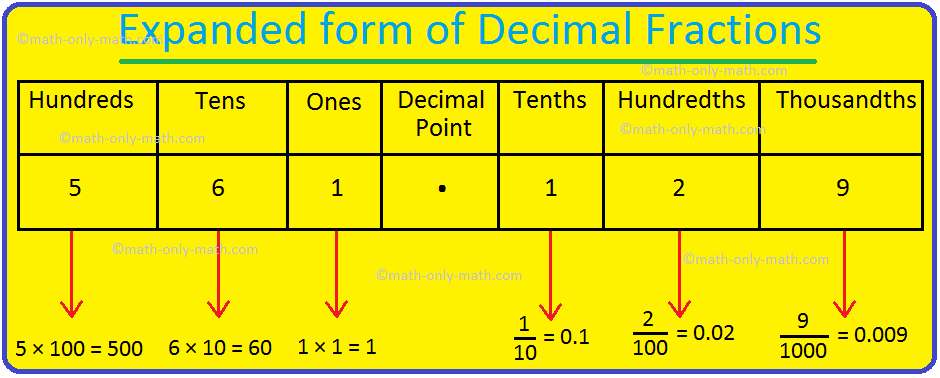
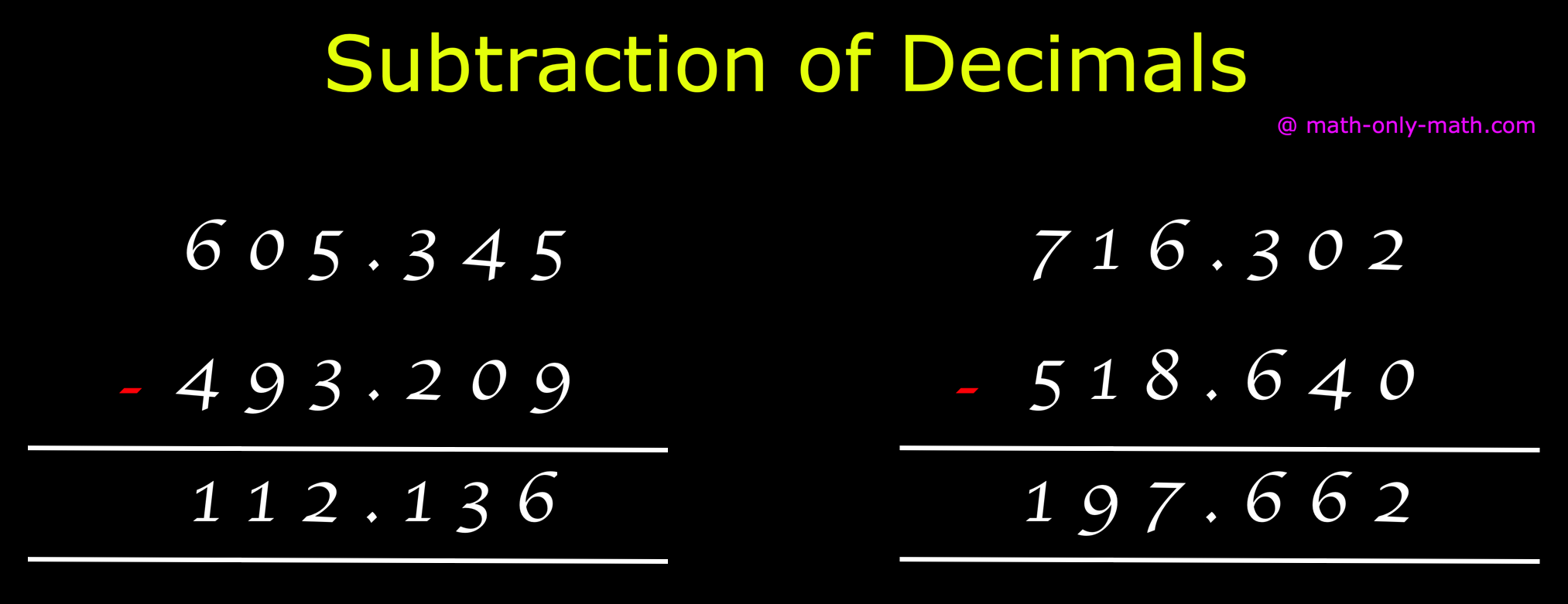
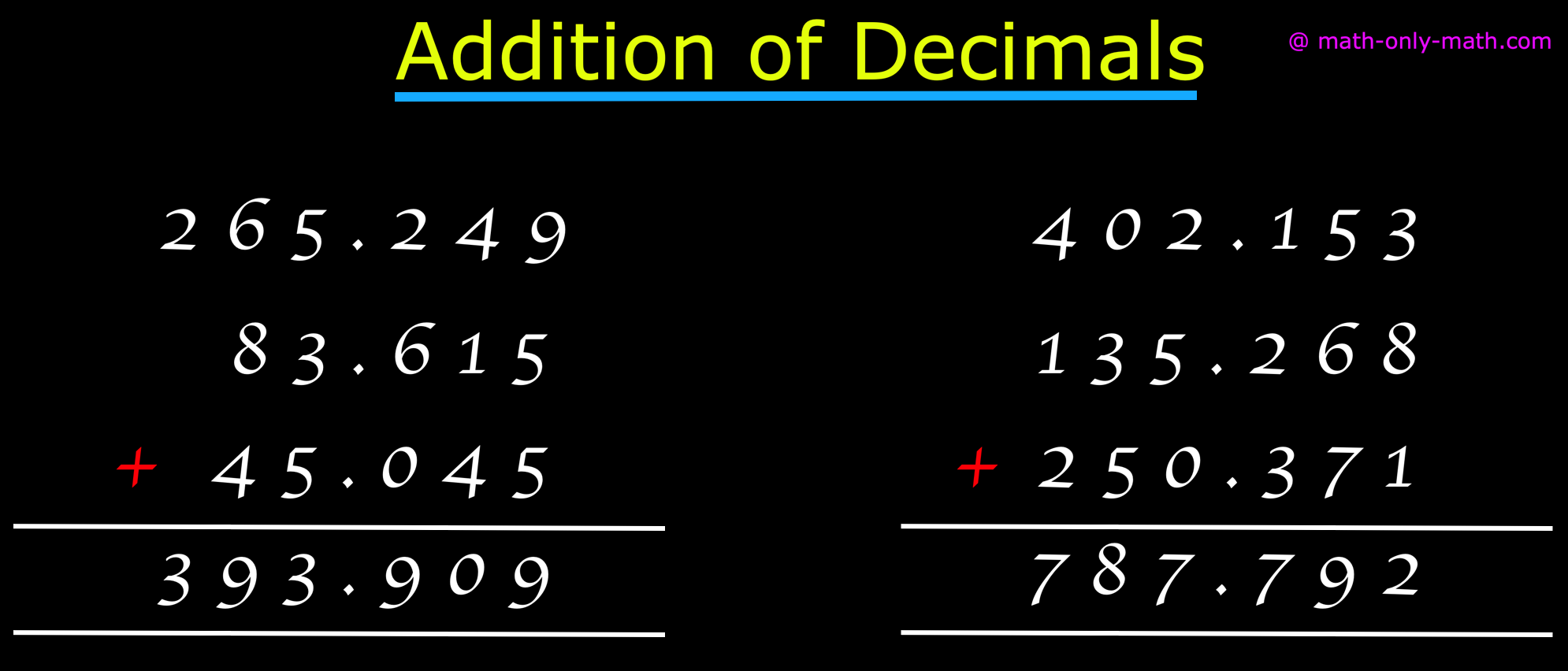




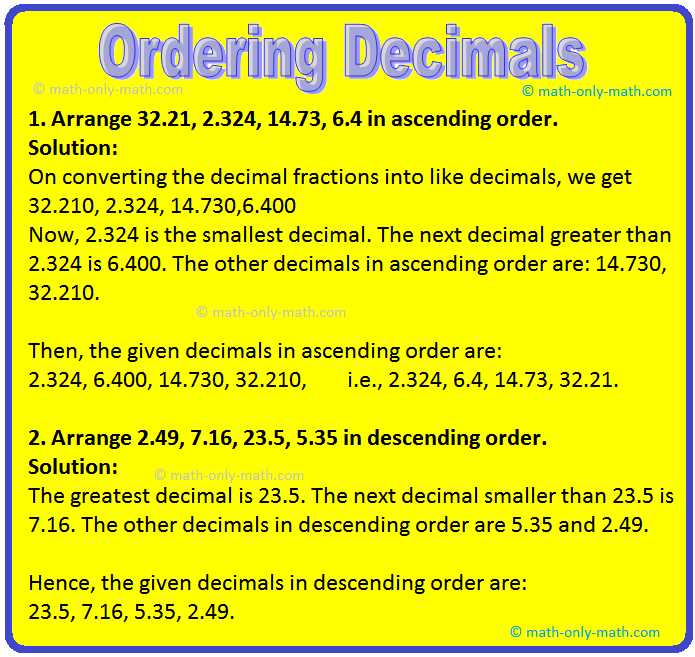
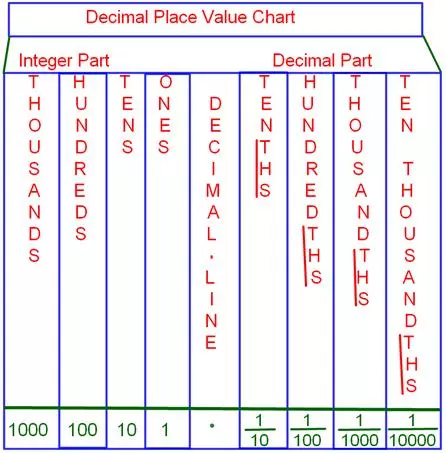




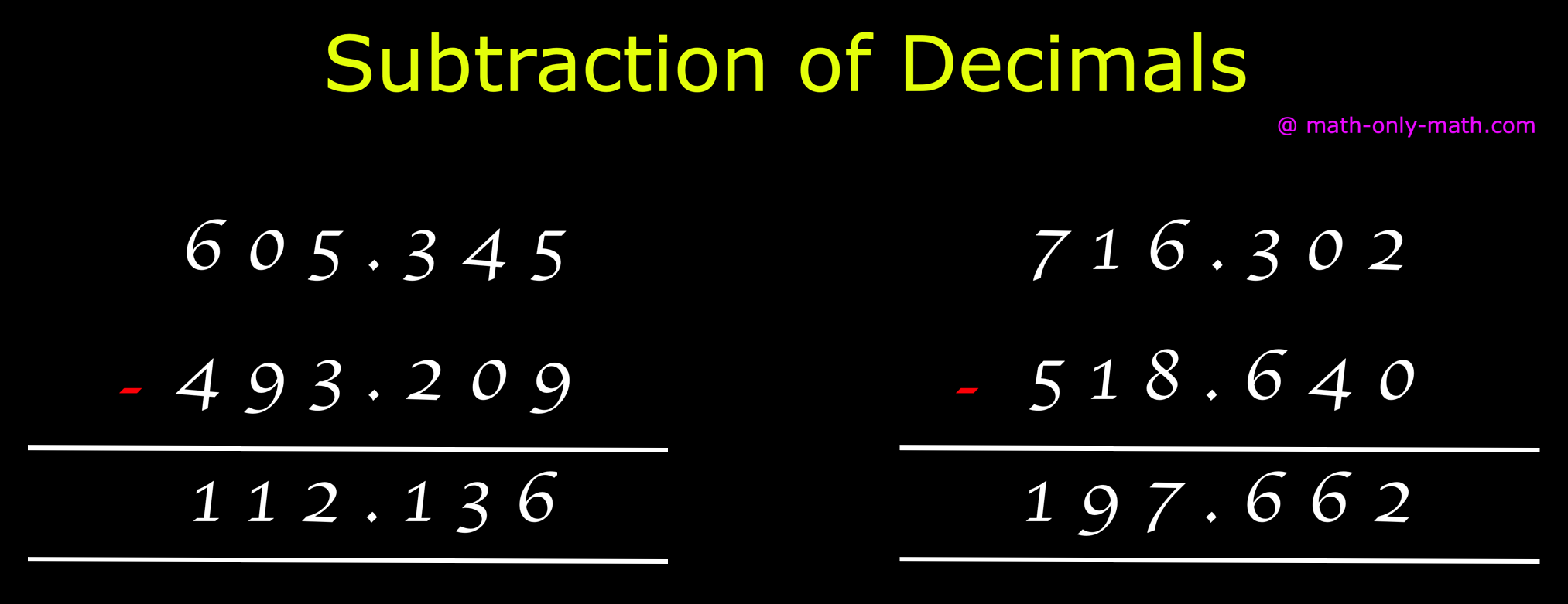
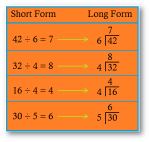
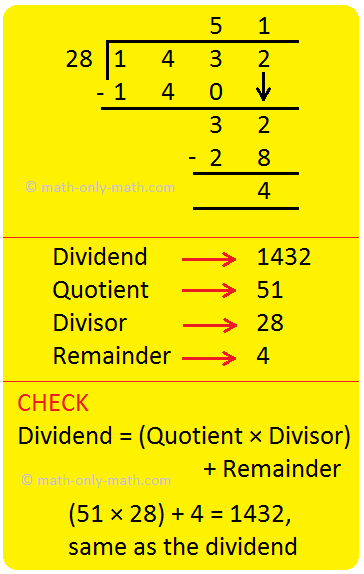

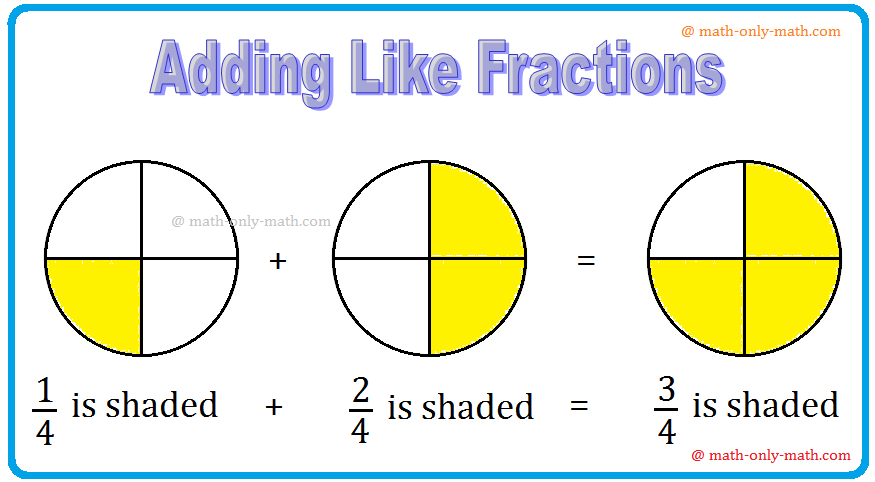
New! Comments
Have your say about what you just read! Leave me a comment in the box below. Ask a Question or Answer a Question.